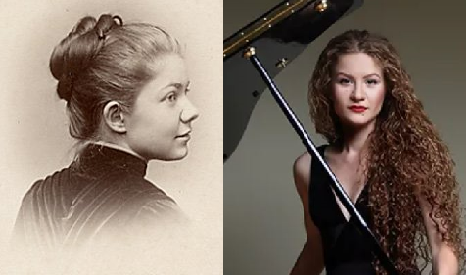It is no secret that we love Amy Beach’s music. After all we sponsor this Amy Beach website and have been diligently working to make sure that all of her music is available in published form. And for a composer who was also a virtuoso pianist, writing a piano concerto was to create a monumental opportunity for her musical ambitions BOTH as a pianist and a composer. She debuted the work herself with the Boston Symphony Orchestra in 1900, and throughout her lifetime and many concerts, she was its only performer.

Amy Beach and Asiya Korepanova
Since then, of course, others have taken on Beach’s concerto, and Saturday, April 19, soloist Asiya Korepanova and Pegasus:The Orchestra bring it to life. Korepanova enthuses: “People say ‘let’s perform more music of women-composers’ – yet the magnificent Amy Beach piano concerto is still almost never played! Only reasons I can see are, it is technically demanding and it is scored for a big orchestra with intricate writing and many solos, but we got that covered with Pegasus: The Orchestra! … Please help us spread the word about it – my dream is to make the Beach concerto the number one performed Romantic American concerto – it has everything in it to take this role!” We agree completely, so do not miss this chance to hear this amazing work in what promises to be a spectacular performance.!
The now-notorious restrictions of the 18-year-old-Amy’s marriage in 1885 to the much older Dr. H.H.A. Beach meant that her aspirations as concert pianist were ended and she was limited to only two public performances per year. Amy re-channeled much of her pianistic energy into composition, with the encouragement and support of her husband. But she did keep practicing. The solo part of her concerto is extremely difficult, and she adopts the broad four-movement concerto form of Brahms. (Beach’s concerto is included on this video-list of the most difficult piano concertos). The somber opening of the orchestra leads to a piano entrance of great determination and torrents of ascending octaves, the first of many demanding feats. But the poignant second theme is one of moving lyricism, as Beach recalls a melody from her own much earlier song, about a grief-stricken father burying his young daughter (poem by Chateaubriand) (all three poems of the songs Beach borrows from are here, as well as links to video performances of them)
Tu dors, pauvre Elisa, si légère d’années,
Tu ne crains plus du jour le poids et la chaleur:
Elles ont achevé leurs fraîches matinées,
Jeune fille et jeune fleur.You are sleeping, dear Elisa, in the lightness of your years,
You no longer fear the oppressive heat of the day:
They have finished their fresh mornings,
Young girl and young flower.
Beach’s biographer, Adrienne Fried Block, links the mournful expression, in the quotation of this song, to Amy’s own feeling of loss at giving up her aspirations as a concert pianist.
In the Scherzo (Perpetuum mobile) Vivace, the piano spins an elaborate filigree of endless 16th-notes around the staid melody that moves through the orchestra. Here Beach quotes from her setting of a poem by her husband, Empress of Night.
Movt. III, a gloomy Largo draws its mood (again) from one of Beach’s songs, Twilight, with a poem by Dr. Beach:
No sun to warm
The darkening cloud of mist,
But everywhere (but everywhere)
The steamy earth sends up
A veil of gray and damp
To kiss the green and tender leaves
And leave its cool imprint
In limpid pearls of dew
The steamy veils and damp kisses are evoked through shifting clouds of chromaticism, and arpeggios cascading through different keys, but the movement ends –
… night comes fast, to drop her pall
Till morn brings life to all.
– turning without a pause into the brightness and joy of IV. Allegro con scioltezza, all vigorous energy, even dancelike, an exuberant outpouring ― until the Largo is briefly recalled and varied with a piano-cello duet ― but then back to the upbeat cascades of incandescence. Listeners are swept away by the brilliance of the finale – truly bringing life to all – as the pianist-composer triumphed in asserting the dual nature of her musician identity.
Pegasus: The Orchestra is led by Artistic Director Karén Hakobyan, and the concert also features the premiere of a new work by Nicholas Gawley, Appalachia, and concludes with Antonín Dvořák’s treasure, The New World Symphony. The concert takes place at Merkin Hall at the Kaufman Music Center in New York City.
